Looking for the best camera for graphic design? Or any creative need, for that matter?
Maybe you’re shooting for clients or maybe your own portfolio?
Well, we’ve got you covered! Below we list the best cameras out there for someone working in a creative field, including the best cameras for graphic design, blogging, vlogging, video, YouTube, filmmaking, and more!
Don’t forget to check out our guide on how to choose the right camera at the end of the photo video.
The Sony A7 III camera is a top choice for photographers and videographers, outperforming SLRs because it has 24MP exceptional low-light image quality, on-sensor autofocus that can track 10FPS, a sealed body, a high-capacity battery, and 4K video capture. | The Fuji X-T30 II is our top value pick that excels with remarkable improvements, vibrant color, creative options, and high-speed performance. | For budget-conscious vloggers, the Lumix G95 offers versatile video and still photography capabilities with 4K resolution, High-Speed Video mode, and microphone/headphone ports. |
Our Top Pick
Best Value
02/20/2024 09:48 pm GMT
15 Best Cameras for Graphic Designers in 2024
- Sony A7 III — Best camera overall (Editor’s Choice)
- Nikon Z6 — Best overall camera runner-up
- Fujifilm X-T30 II — Best value camera
- Nikon D850 — Best DSLR camera
- Panasonic Lumix G95 / G90 — Best budget camera & best for vloggers
- Nikon Z50 — A Great upgrade for former DSLR users
- Olympus OM-D E-M5 Mark III — Best all-around camera
- Canon EOS Rebel SL3 / EOS 250D — Best DSLR camera for beginners
- Olympus Tough TG-6 — Best tough camera
- Nikon Z 7II — One of the best high-resolution mirrorless cameras
- Panasonic Lumix DC-GH5 II — Best 4K camera for video
- GoPro Hero 9 — Best affordable on-the-go camera
- Canon EOS 5D Mark IV — Best high-end camera for designers
- Canon EOS Rebel T7 DSLR Camera — Best beginner DSLR camera
- Panasonic Lumix FZ300 — Best Camera with a 4K Photo Technology
What is the Best Camera for Graphic Designers and Creatives in 2024?
Sony A7 III is the best camera for graphic designers and creatives. Check out the table to see a comparison of the other best cameras for graphic design and choose what is right for you.
Title
Sony a7 III ILCE7M3/B Full-Frame Mirrorless Interchangeable-Lens Camera with 3-Inch LCD, Body…
Panasonic LUMIX G95 20.3 Megapixel Mirrorless Camera, 12-60mm F3.5-5.6 Micro Four Thirds Lens,…
CANON EOS Rebel SL3 DSLR Camera, Built-in Wi-Fi, Dual Pixel CMOS AF and 3.0 inch Vari-Angle Touch…
Fujifilm X-T30 Mirrorless Digital Camera, Black (Body Only)
OM SYSTEM OLYMPUS OM-D E-M5 Mark III Body Black
Lens
28-70mm F3.5- 5.6 OSS Lens
Viewfinder
3.0-inch tilt-angle touchscreen, 1,040K dots
Screen Type
76 mm (3 in) with 921,600 dots
3.0-inch vari-angle touchscreen, 1,040,000 dots
3.0-inch vari-angle touchscreen, 1,040,000 dots
3.0-inch touchscreen, 1,240,000 dots
Max Continuous Shooting Rate
Thumbnail

Title
Sony a7 III ILCE7M3/B Full-Frame Mirrorless Interchangeable-Lens Camera with 3-Inch LCD, Body…
Lens
28-70mm F3.5- 5.6 OSS Lens
Screen Type
76 mm (3 in) with 921,600 dots
Max Continuous Shooting Rate
Thumbnail

Title
Panasonic LUMIX G95 20.3 Megapixel Mirrorless Camera, 12-60mm F3.5-5.6 Micro Four Thirds Lens,…
Screen Type
3.0-inch vari-angle touchscreen, 1,040,000 dots
Max Continuous Shooting Rate
Thumbnail

Title
CANON EOS Rebel SL3 DSLR Camera, Built-in Wi-Fi, Dual Pixel CMOS AF and 3.0 inch Vari-Angle Touch…
Screen Type
3.0-inch vari-angle touchscreen, 1,040,000 dots
Max Continuous Shooting Rate
Thumbnail

Title
Fujifilm X-T30 Mirrorless Digital Camera, Black (Body Only)
Screen Type
3.0-inch touchscreen, 1,240,000 dots
Max Continuous Shooting Rate
If you are particularly looking for a video camera – check our consolidated list of the best 4K cameras for video.
Top Cameras for Graphic Designers & Creatives
1. Sony A7 III (Editor’s Choice)

The Best Camera for Graphic Designers Overall
Sensor size: Full-frame | Resolution: 24.2MP | Viewfinder: 2,359K dots | Monitor: 3.0-inch tilt-angle touchscreen, 921K dots | Autofocus: 693-point AF | Maximum continuous shooting rate: 10fps | Movies: 4K at 30p
Now in its third iteration, the A7 line of mirrorless cameras, from Sony is finally starting to move things in the right direction by offering a great camera that stands out compared to many of its competitors in the full-frame mirrorless camera space.
The Eye AF feature works seamlessly with AF-C mode, delivering fast and precise eye detection even with moving subjects. This game-changer for portrait photography ensures razor-sharp focus on your subject’s eyes.
We especially love its newly developed back-illuminated image sensor and advanced image processing. We can attest that this incredible camera captures scenes with astonishing clarity and detail, even under challenging lighting conditions. It’s like having the quality of a full-frame camera in a compact body.
The extended ISO range (ISO 100-51200, expandable to ISO 50-204800 for stills) combined with Detail Reproduction and Area-specific Noise Reduction technologies means your images remain detailed and free from noise, a critical factor for graphic designers.
Its high-precision stabilization unit, gyro sensors, and advanced algorithms offer a remarkable 5.0-stop advantage in compensating for camera shake, making it ideal for capturing sharp and professional-looking images.
Silent shooting up to 10 fps with AF/AE tracking is invaluable when even the slightest noise can mean missing the perfect shot.
With 693 phase-detection AF points covering approximately 93% of the image area and an additional 425 densely positioned contrast-detection AF points, this camera provides precise and rapid autofocus, catering to various photography ideas and needs.
One notable downside is the absence of an in-body flash, which can be inconvenient when you need quick and spontaneous lighting, but external flash equipment is readily available.
Pros | Cons |
| ➕ Dual SD slots | ➖ Only one card slot is UHS-II |
| ➕ 10fps with tracking | ➖ No in-body flash |
| ➕ 4K HDR video | ➖ Dense menu system |
| ➕ Silent shooting available | |
| ➕ Tilting touch LCD |
Latest Price on Amazon:
Sony a7 III ILCE7M3/B Full-Frame Mirrorless Interchangeable-Lens Camera with 3-Inch LCD, Body…
- Advanced 24.2MP BSI full frame Image Sensor w/ 1.8X readout speed.Aspect Ratio – 3:2, Headphone Terminal : Yes (3.5 mm Stereo minijack), Mic Terminal : Yes (3.5 mm Stereo minijack). Brightness Control…
- 15 stop dynamic range, 14 bit uncompressed RAW, ISO 50 to 204,800. Compatible with Sony E mount lenses. Can be connected via Bluetooth with smartphones featuring (as of the date of release)- Android…
- Up to 10fps silent or mechanical shutter with AE/AF tracking. Battery life (Still Images): Approx. 610 shots (Viewfinder) / approx. 710 shots (LCD monitor), battery life (Movie, continuous recording):…
- 693 phase detection / 425 contrast AF points w/ 93 percent image coverage. Focus sensor: Exmor R CMOS sensor
- In the box: Rechargeable battery (NP FZ100), AC adapter (AC UUD12), shoulder strap, body cap, Accessory shoe cap, Eyepiece cup, Micro USB cable. Metering type: 1200 zone evaluative metering
Sony A7 III Review
Want a closer look at this fine camera? Check out this Sony A7 III review video:
Video By: Dan Watson/YouTube
2. Nikon Z6
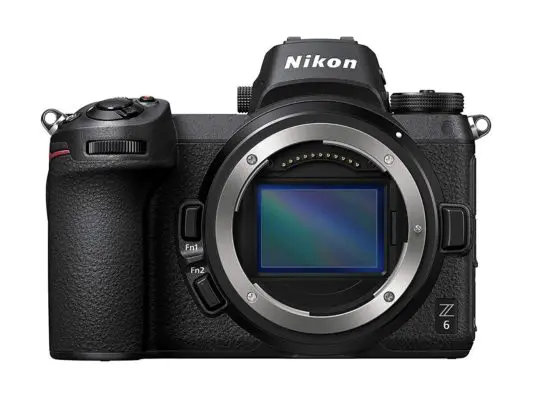
The best camera overall runner-up
Type: Mirrorless | Sensor size: Full-frame CMOS | Resolution: 24.5MP | Lens: Nikon Z mount | Viewfinder: EVF | Screen type: 3.2-inch tilting touchscreen, 2,100,000 dots | Maximum continuous shooting speed: 12fps | Movies: 4K
A fantastic all-around camera with great cameras and incredible handling, there is no other camera out there currently that can beat the versatility, affordability, and usability when it comes to the Z6 from Nikon.
Its impressive features come together to deliver top-notch performance. Equipped with a 24.5 MP Full-Frame BSI image sensor and Nikon’s advanced EXPEED 6 image processor, this camera excels in capturing sharp, vibrant, and high-resolution photos and videos—a hallmark of Nikon’s reputation.
Furthermore, the camera’s new Z Mount sets it apart by offering the widest lens mount in full-frame. This results in more light and faster performance and opens up dynamic range and possibilities for thrilling new lens designs featuring up to f/0.95 maximum apertures.
The Nikon Z6 doesn’t compromise on speed, either. With the ability to capture up to 12 frames per second at full resolution in Hi+ mode (12-bit RAW or JPEG), you will get those crucial shots even in fast-paced situations.
In terms of connectivity, the camera is well-equipped, allowing for easy transfer of photos and videos to your smartphone via Wi-Fi or Bluetooth through the Nikon SnapBridge app. Additionally, you can use your phone as a remote monitor to precisely frame your shots.
Another noteworthy feature is the camera’s silent shooting mode, which is particularly useful for discreet capturing during recitals, weddings, or newborn photography.
We also suggest this camera for videographers. The Nikon Z6 can also be part of your video marketing tools. Offering 4K video recording camera sensor that ensures your videos are of the highest quality.
Its fast and accurate focus, boasting 273 on-sensor AF points that cover approximately 90% of the frame, ensures your subjects are acquired swiftly and tracked seamlessly, even at the edges.
Portrait photographers will also appreciate the Eye-Detection AF feature, which locks focus on your subject’s eye. This is especially handy when dealing with subjects who frequently change their pose or when multiple subjects are in the frame.
Additionally, the camera’s Animal Detection AF allows for precise focus on the eyes of dogs or cats and maintains focus on their faces during video recording.
The Subject Tracking AF feature ensures the focus remains steady on your subject, whether you’re using the electronic viewfinder (EVF) or the LCD screen, even if the subject momentarily turns away or moves out of view.
Lastly, the Nikon Z6’s in-body 5-axis VR image stabilization is compatible with all Nikon Z lenses, providing up to five stops of stabilization in five directions – yaw, pitch, roll, X, and Y. This ensures your shots remain steady and sharp, even in challenging conditions.
While this might be a small deal-breaker for many, having only one slot can pose a risk when working with critical projects that demand redundant storage or quick card swaps.
Nonetheless, this limitation is outweighed by the camera’s exceptional capabilities, making it an Editor’s Choice for creative professionals.
Pros | Cons |
| ➕ High ISO performance | ➖ Single card slot |
| ➕ Eye-detection AF for stills | ➖ The rear display does not offer swivel functionality |
| ➕ 12fps burst speeds | ➖ Colors can be a bit reddish |
| ➕ Fast cycle times | ➖ Limited native lens selection |
| ➕ Good buffer depths | ➖ 1/200s x-sync speed |
| ➕ 4K focus peaking | |
| ➕ Rugged build quality | |
| ➕ Organized menus |
Latest Price on Amazon:
Nikon Z6 Full Frame Mirrorless Camera Body
- Large, full frame Z mount for Revolutionary optical performance
- Nikon-designed 24. 5MP backside illuminated image sensor
- 273-Point on-sensor Phase detect AF system
- Up to 12 fps; 4K Ultra-HD video; 6K time-lapse; 1080P/120Fps slow motion
- Compatible with NIKKOR Z lenses, over 360 F-mount NIKKOR lenses
3. Fuji X-T30 II
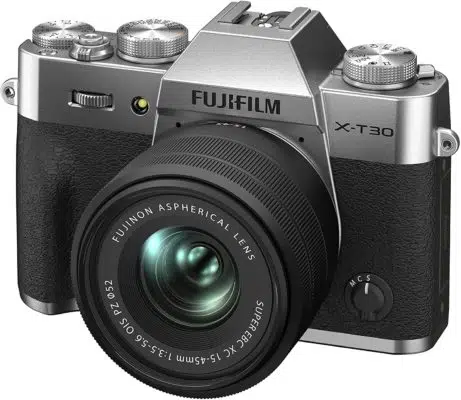
Best value camera
Sensor : 26.1MP APS-C X-Trans BSI CMOS 4 | Resolution: 1.62-million-dot LCD screen | Viewfinder: 2.36m-Dot OLED Electronic | Autofocus: -7EV in just 0.02 secs | Movies: 4k
The all-new Fuji X-T30 II is a great improvement over the original version, offering a 1.62-million-dot LCD screen and some minor software/hardware upgrades.
The latest-generation APS-C sensor minimizes noise and extends sensitivity to ISO160, ensuring that your images are sharp and vibrant.
Fujifilm’s expertise in color science, developed over 85 years, guarantees outstanding color reproduction. The quad-core X-Processor 4, combined with the sensor, provides various Film Simulation options, allowing you to create your distinctive visual style.
To achieve the perfect look, you can blend Film Simulations with other effects, such as film grain texture, color depth, and clarity.
Graphic designers, photographers, and filmmakers will appreciate the 18 different Film Simulation modes, each meticulously crafted to reproduce Fujifilm’s popular analog films and timeless photo-finishing processes.
The X-T30 II also boasts advanced autofocus technology, delivering rapid and precise focus across the frame, ensuring you capture every opportunity flawlessly.
Switching between exposure modes is a breeze with the X-T30 II, thanks to its control mode, which combines the Shutter Speed Dial and the Aperture Ring on the lens. Even in AUTO mode, this camera excels, delivering stellar image quality straight out of the box.
For those moments where speed is essential, the X-T30 II shines with its 8 frames-per-second mechanical shutter and a staggering 20 frames-per-second Electronic Shutter. This camera is up to the task, whether you’re capturing stills or action shots.
In conclusion, the Fuji X-T30 II combines powerful features with an intuitive design, making it one of the most needed tools for graphic designers. Its color accuracy, creative options, and high-speed capabilities ensure you have everything you need to bring your vision to life.
While the Fuji X-T30 II impresses with its creative features and design, it does have a minor drawback: it doesn’t ship with a dedicated battery charger.
Pros | Cons |
| ➕ Improvement to the LCD, went from 1.04M-dot panel to 1.62M dots | ➖ Still it does not ship with a dedicated battery charger |
| ➕ Thicker than the original X-T30 (0.8mm) | |
| ➕ Increased RAM |
Latest Price on Amazon:
Fujifilm X-T30 II XC15-45mm Kit – Silver
- Assured Image Quality X-T30 II uses Fujifilm’s fourth-generation X-Trans CMOS 4 back-illuminated sensor, designed to minimize noise, while also extending sensitivity to ISO 160. The unique structure…
- Incredible Focusing in All Conditions Never miss a moment, thanks to the X-Processor 4 quad-core CPU inside X-T30 II. It offers fast, accurate autofocusing in as little as 0.02 secs on any subject,…
- Advanced Video and Imaging Controls A truly versatile imaging device, X-T30 II offers the ability to record 4K video at 30 frames-per- second, or 240fps at 1080p, to create 10x super slow-motion…
- In Touch With Your Creativity From the dial-based operation, and compact, lightweight body, to the latest-generation Fujifilm APS-C sensor, X-T30 II lights up the imagination and inspires creativity…
- Made for Sharing X-T30 II is primed for sharing. Use Bluetooth or Wi-Fi to share your memories with friends and family on social media, by connecting and downloading images to the FUJIFILM Camera…
4. Nikon D850
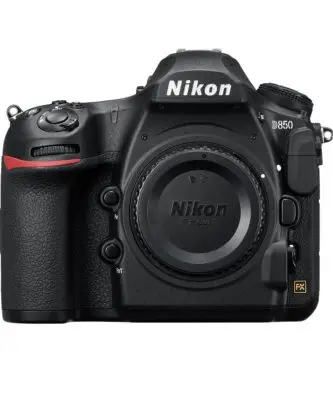
The DSLR camera that delivers every time
Type: DSLR | Sensor size: Full-frame CMOS | Resolution: 45.4MP | Lens: Nikon F mount | Viewfinder: Optical | Screen type: 3.2-inch tilting touchscreen, 2,359,000 dots | Maximum continuous shooting speed: 7fps | Movies: 4K
Many cameras on the top ten lists are all mirrorless in the current landscape, so you’d think that DSLR models have had their day in the sun but the D850 from Nikon keeps reminding people how good these cameras can be.
A 45MP resolution is perfect for those looking for high resolution and 4K video recording, and a rugged case protects it from the elements.
The only factor that sets it apart from its mirrorless competition is battery life. At a whopping 1800 frames per charge, the last thing you should ever have to worry about is running out of juice.
Pros | Cons |
| ➕ Excellent dynamic range (14.8 EV) | ➖ When using an optical viewfinder, the AF point coverage is limited |
| ➕ High ISO performance | ➖ Video clip limit (30 min) |
| ➕ Improved JPEG image quality compared to the predecessor | ➖ No built-in flash |
| ➕ Quick start-up | ➖ Electronic VR and focus peaking are not supported for 4K video |
| ➕ Low shutter lag | |
| ➕ Robust body | |
| ➕ 7fps burst mode |
Latest Price on Amazon:
Nikon D850 FX-Format Digital SLR Camera Body
- Nikon designed back side illuminated (BSI) full frame image sensor with no optical low pass filter
- 45.7 megapixels of extraordinary resolution, outstanding dynamic range and virtually no risk of moiré
- Up to 9 fps1 continuous shooting at full resolution with full AF performance
- 8k6 and 4k time lapse movies with new levels of sharpness and detail; file system : DCF 2.0, exif 2.31, Pict bridge
- Tilting touchscreen, focus shift shooting mode, outstanding battery performance and much more; total pixels: 46.89 million
5. Panasonic Lumix G95 / G90
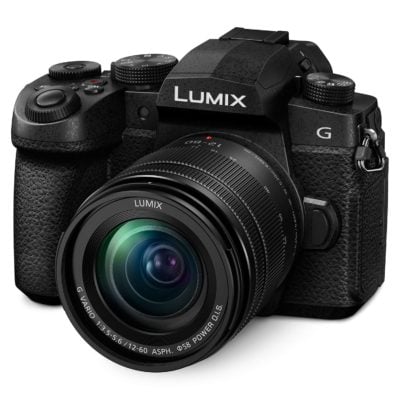
A great camera for vloggers
Type: Mirrorless | Sensor size: Micro Four Thirds | Resolution: 20.3MP | Lens: Micro Four Thirds | Screen type: 3.0-inch vari-angle touchscreen, 1,040,000 dots | Viewfinder: EVF | Maximum continuous shooting rate: 9fps/30fps | Movies: 4K
Many vloggers who are in the market for a new camera should consider the Lumix G95. It’s a great option that’s as good at shooting video as it is shooting stills. The lightweight camera has great flexibility and sound quality.
The G95 manages to fit a lot of features into its small design. Shooting video is a breeze with 4K resolution and frame rates of 24p, 25p, and 30p while you can record in FullHD up to 120fps in the cameras High-Speed Video mode.
The camera includes a microphone and head-socket ports to help make video creation even easier.
Pros | Cons |
| ➕ Unlimited video recording | ➖ Short battery life |
| ➕ Dual IS system with 5-axis image stabilization | ➖ No USB Type-C connection |
| ➕ Improved white balance options |
Latest Price on Amazon:
Panasonic LUMIX G95 20.3 Megapixel Mirrorless Camera, 12-60mm F3.5-5.6 Micro Four Thirds Lens,…
- Focus on Your Creativity: Perfect for photographers who are ready to excel, the LUMIX G95 has a superb, powerful 20.3 MP Digital Live MOS sensor and advanced technologies for both photo and video
- Versatile and Portable: Lightweight Micro Four Thirds mirrorless camera is weather sealed with a flexible, free-angle monitor, ready for any adventure; LUMIX G 12-60mm F3.5-5.6 POWER O.I.S. lens…
- Exceptional Flexibility: 4K 24/30P video capture, plus preinstalled Vlog-L, features log characteristics with 12 Stops of dynamic range for maximum freedom in editing. Send out 4: 2: 2/ 8 bit video to…
- Features for Maximum Expression: Live View Composite mode lets you compose a single image out of many; adjust focus after shooting; develop, and retouch inside this photography camera
- High Sound Quality: External microphone/headphone jacks let you record and monitor sound using external equipment
6. Nikon Z50
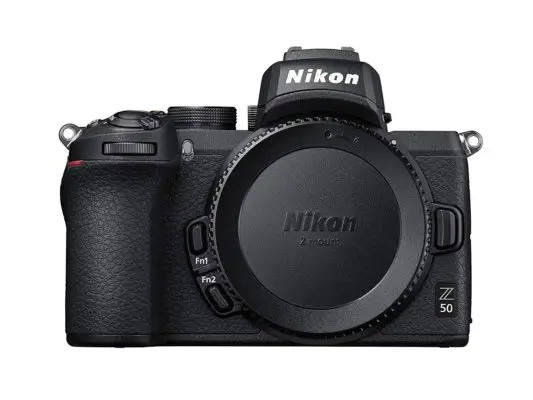
The perfect upgrade for former DSLR owners
Type: Mirrorless | Sensor size: APS-C | Resolution: 20.9MP | Lens: Z-mount | Screen type: 3.2-inch tilting touchscreen, 1,036,080 dots | Viewfinder: EVF | Maximum continuous shooting rate: 11fps | Movies: 4K
While the Z6 is the best camera on our list, its price might leave some with smaller budgets looking for another answer.
Enter the Z50, which is an excellent choice if you’re looking for a high-quality, mid-range APS-C camera and is an even better option if you’re looking to change from DSLR to mirrorless.
With its deep grip, the Z50 puts a priority on the handling of the camera. An excellent viewfinder and tilting touchscreen help you produce great photos which are especially helpful when you are taking general or even travel photos plus the autofocus system works extremely well on static subjects.
Pros | Cons |
| ➕ 4K video-11fps continuous shooting | ➖ Single UHS I SD card slot |
| ➕ Good image quality | ➖ No built-in image stabilization |
| ➖ 300-shot battery life |
Latest Price on Amazon:
Nikon Z 50 | Compact mirrorless stills/video camera | Nikon USA Model
- Compact, lightweight and durably constructed mirrorless camera
- First DX-format mirrorless camera to use a large 55mm lens mount, offering advantages in high image quality and lowlight performance.
- 20.9 MP sensor with robust 4K UHD video features
- Built-in Wi-Fi and Bluetooth for simple pairing to a smartphone.
- “Selfie” flip down touch LCD screen, great for self-portraits and vlogging.
7. Olympus OM-D E-M5 Mark III
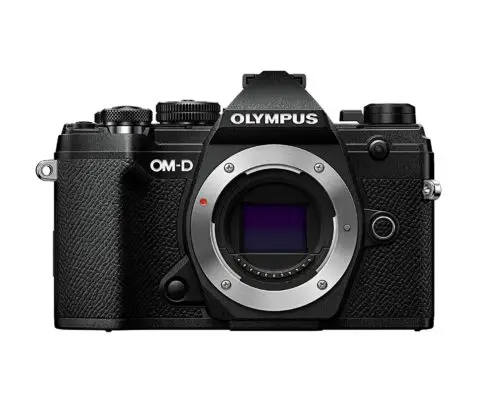
The Best All-around Camera
Type: Mirrorless | Sensor size: Four Thirds | Resolution: 20.4MP | Lens: Micro Four Thirds | Viewfinder: 2.36M-dot OLED EVF | Screen type: 3-inch vari-angle touchscreen, 1,040,000 dots | Maximum continuous shooting speed: 30fps | Movies: 4K
No matter how much money you spend on something, you might not ever get everything that you’re hoping for. This is true when it comes to cameras, although the Mark III from Olympus certainly comes close.
With a polycarbonate shell, the casing may feel like a step down from its predecessor but the Mark III is lighter and is amazing to handle.
Not only does it have good looks, but the processor inside the camera is also powerful and the shooting modes and image stabilization will help any skill level.
The combination of style, speed, and versatility makes it one of the best all-around cameras available.
Pros | Cons |
| ➕ Stabilized image sensor | ➖ Plastic exterior |
| ➕ Includes external flash | ➖ The charging port is not USB-C |
| ➕ Well-established lens system |
Latest Price on Amazon:
OM SYSTEM OLYMPUS OM-D E-M5 Mark III Body Black
- 20MP live MOS sensor
- Portable, weather sealed design
- 121-point all-cross-type on-chip phase detection AF
- Compact, in-body 5-axis image stabilization (up to approx. 5.5 EV steps of compensation)
- 50MP tripod high-resolution shot
8. Canon EOS Rebel SL3 / EOS 250D
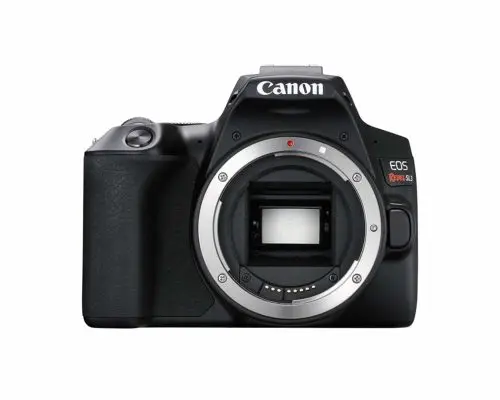
The Best Beginners DSLR
Type: DSLR | Sensor: APS-C CMOS | Resolution: 24.2MP | Lens mount: Canon EF | Viewfinder: Optical | Screen type: 3.0-inch vari-angle touchscreen, 1,040,000 dots | Maximum continuous shooting speed: 5fps | Movies: 4K
One of the best DSLRs for beginners, the EOS 250D from Canon is the world’s smallest DSLR with a fully articulating screen which is great news for vloggers.
With 4K recording and a new processor inside the camera as new features, the 24.2MP sensor will give your photos that extra something, and while you’re shooting live views and videos, the fluid AF system will come into play.
With an easy-to-understand interface and affordable pricing, the EOS 205D is an amazing first choice for a DSLR.
Pros | Cons |
| ➕ Good choice for students | ➖ Limited 9-point autofocus system |
| ➕ Good image quality | ➖ No in-body image stabilization |
| ➕ Extensive lens range | ➖ Not compatible with third-party flash units |
| ➕ 4K video recording | |
| ➕ Light body |
Latest Price on Amazon:
9. Olympus Tough TG-6
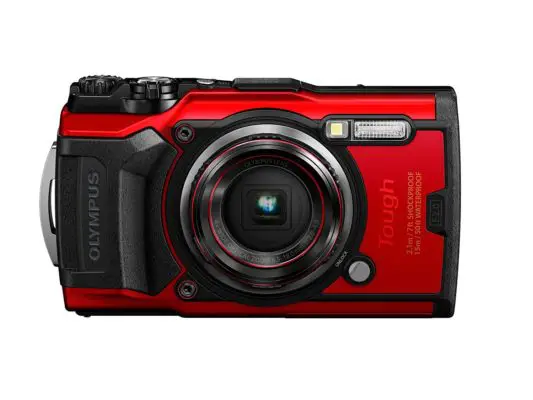
A tough camera with high-end features
Type: Compact | Sensor: 1/2.3-inch | Resolution: 12MP | Lens: 25-100mm f/2-4.9 | Viewfinder: N/A | Monitor: 3.0-inch screen, 1,040,000 dots | Maximum continuous shooting speed: 20fps | Movies: 4K |
Depending on what you do for your business that may mean taking photos in some unique environments. When these occur, using a smartphone is likely not going to end well. The Tough TG-6 from Olympus is a great choice.
Waterproof to 45 feet, crushproof to weights of 100kg, and drop-proof from heights of 7 feet, the TG-6 is one tough little camera. Able to shoot 4K video at 30p or high-speed at 120p in FullHD.
While intended for underwater photography, the design is still great for those working on the land as well.
Pros | Cons |
| ➕ 4K and high-speed video | ➖ 12MP image resolution |
| ➕ Shoots RAW format | ➖ No fully manual control |
Latest Price on Amazon:
Olympus Tough TG-6 Digital Camera, Red
- Water proof (50 feet /15 meter), dust proof, shock proof (7 feet / 2.1 meter), crush proof (100 kgf), freeze proof (14 degree Fahrenheit / -10 degree Celsius), anti-fog
- High resolution F2.0 lens, maximum 8x zoom, true pic VIII, back illuminated CMOS image sensor
- Variable macro system comprised of 4 macro shooting modes, magnified shooting up to 1 centimeter from the end of the lens
- 5 underwater shooting modes including underwater microscope, 3 underwater white balance modes
- 4K movie and full HD 120 fps high speed movies can be recorded. Battery life – Approx. 340 Images (using Toshiba SDHC UHS-I Card Exceria with is on, based on CIPA testing standards). Approx. 50…
10. Nikon Z 7II
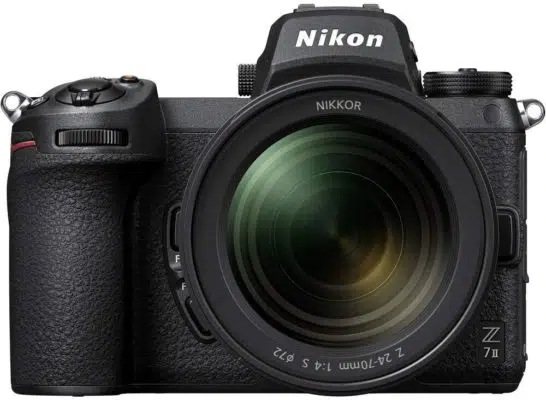
Best high-resolution mirrorless camera
Type: Mirrorless Camera | Sensor: BSI-CMOS | Resolution: 45.7MP | Lens: 24-70mm F4 lens | Viewfinder: N/A | Monitor: 3.2-inch screen, 2,100,000 dots | Maximum continuous shooting speed: 10fps | Movies: 4K/60p
Nikon delivers yet another iteration of the Z 7 with the Nikon Z 7 II. This amazing mirrorless camera is great for professionals and camera enthusiasts alike!
With a 45.7 MP Sensor, Dual SD card slots, and 4k/60p video recording facilities, this camera will not disappoint.
The Nikon Z 7 II comes with 5-axis Image Stabilization, ensuring that photos and videos are safe from shaky hands.
It has 10fps burst shooting with a single-point focus to capture multiple high-resolution images, which can come in quite handy during a photoshoot or when capturing wildlife.
Even though the Nikon Z 7 II has some stiff competition, it will not fail to deliver, putting this camera on the smart buy list of the digital camera world.
Pros | Cons |
| ➕ 45.7 MP sensor ensures amazing image quality | ➖ AF features could be better |
| ➕ Can shoot 4k videos at 60 fps | ➖ Battery life is a bit underwhelming |
| ➕ It’s splash and dust-protected |
Latest Price on Amazon:
Nikon Z 7II 45.7MP Mirrorless Digital Camera with 24-70mm Lens (1656) USA Model Deluxe Bundle with…
- THIS NIKON CAMERA BUNDLE CONTAINS: Nikon Z 7II Mirrorless Digital Camera (Body Only) + Nikon NIKKOR Z 24-70mm f/4 S Zoom Lens + Sony 64GB XQD G Series Memory Card + Large DSLR Camera Gadget Bag +…
- PERFECT COMBINATION: 45.7MP FX-Format BSI CMOS Sensor – Paired With Dual EXPEED 6 Image Processors – Fast Continuous Shooting Rate of 10 fps
- EASY-TO-USE FEATURES: 3.2″ 2.1m-Dot Tilting Touchscreen LCD Monitor – UHD 4K30 Video Recording at 30p – Wi-Fi and Bluetooth Connectivity
- HIGH-QUALITY OUTPUT: 493-Point Phase-Detect AF System – Native ISO Range: 64-25600 – CFexpress Type B/XQD/SD/SDHC/SDXC Memory Card Compatible
- HIGH-QUALITY OUTPUT: 493-Point Phase-Detect AF System – Native ISO Range: 64-25600 – CFexpress Type B/XQD/SD/SDHC/SDXC Memory Card Compatible
12. Panasonic Lumix DC-GH5 II
Best 4K camera for video and filmmaking
Sensor size : Micro Four Thirds | Resolution: 20.3MP | Viewfinder: EVF | Monitor: 3-inch vari-angle display, 1,840,000 dots | Maximum continuous shooting rate: 12fps | Movies: 4K
Panasonic Lumix DC-GH5 II is an amazing, picture-perfect video camera and stills camera, making it an ideal pick for content creators.
It is the latest in the mirrorless Micro Four Thirds edition and comes with some serious and interesting updates from the GH5. The new anti-reflective coating reduces ghosting and flare.
The live streaming capability is superb, and with a great processor plus battery life, you can keep going for hours on the go. For faster frame rates, you even get an option for 4K and 6K photo modes.
There’s a lot more in this Panasonic beast and with firmware updates being rolled out regularly, you get access to the latest features.
Pros | Cons |
| ➕ Stabilized sensor | ➖ Video autofocus can drift |
| ➕ The camera body is dust and splash protected | ➖ Doesn’t support Raw video recording |
| ➕ Dual UHS-II card slots | |
| ➕ 10-bit 4K60 internal recording | |
| ➕ Broad library of autofocus lenses |
Latest Price on Amazon:
Panasonic LUMIX GH5M2, 20.3MP Mirrorless Micro Four Thirds Camera with Live Streaming, 4K 4:2:2…
- THE ICONIC GH5, NOW WITH LIVE STREAMING: Attention hybrid content creators—the GH5M2 supports both wired and wireless unlimited live streaming for indoors and outdoors, together with a USB Power…
- VIDEO FORMAT OPTIONS FOR PROFESSIONAL USE: The GH5M2 is capable of unlimited video recording in various settings including C4K/4K 60p 4:2:0 10-bit and simultaneous output over HDMI during 4K 60p…
- PHOTO STYLE PRESETS MINIMIZE YOUR EDITING: Presets include V-LogL, Cinelike D2/ V2, MonochromeS and L.ClassicNeo.
- POWERFUL IMAGE STABILIZATION: Advanced I.S. to 6.5-stop slower shutter speeds for stable handheld shooting. Double SD Memory Card slot for relay recording.
- WITHSTANDS HEAVY FIELD USE: The magnesium alloy full die-cast front / rear frame and is not only splash and dust resistant, but also freezeproof down to -10 °C (14°F).
13. GoPro Hero 9
Best affordable on-the-go camera
Sensor : CMOS Sensor | Resolution: | Aspect Ratio: 16:9 | Shutter speed: 1/25 – 1/2000 Seconds (Photo)
The GoPro Hero 9 is arguably the most versatile and powerful action camera, with some great updates from its predecessors.
It offers 5K video recording, a new front-facing display, and a bigger, reliable battery.
The overall performance is fabulous with HyperSmooth 3.0 stabilization, giving this camera an edge over the competitors.
The new shooting modes through GoPro labs are another good addition for creatives to try something new.
Pros | Cons |
| ➕ Great price | ➖ Larger than before |
| ➕ Full-color front display | ➖ Heavier |
| ➕ 5K video and 20-mp photos | ➖ No new slo-mo speeds |
| ➕ Battery life has improved | |
| ➕ Useful new shooting features |
Latest Price on Amazon:
GoPro HERO9 Black – Waterproof Action Camera with Front LCD and Touch Rear Screens, 5K Ultra HD…
- 5K Video – Shoot stunning video with up to 5K resolution, perfect for maintaining detail even when zooming in
- 20MP Photo with SuperPhoto – Capture crisp, pro-quality photos with 20MP clarity. And with SuperPhoto, HERO 9 Black can automatically pick all the best image processing for you
- Front Display plus Rear Touch Screen – A new, larger rear touch screen with touch zoom on HERO9 Black and a dazzling new front display makes for easy framing and intuitive camera control.Included…
- Live Streaming plus Webcam – Live stream in 1080p on social, get HyperSmooth stabilization as you broadcast
- HyperSmooth 3.0 – Experience the ultimate smoothness with our most advanced video stabilization ever
14. Canon EOS 5D Mark IV
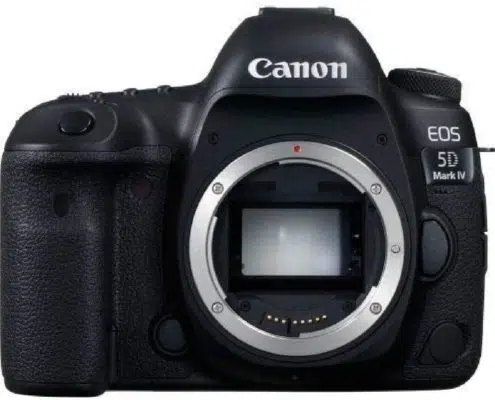
Best high-end camera for designers
Display: 8K | Resolution: 45MP | Type: Mirrorless | Sensor size: Full-frame | Lens: RF mount
When it comes to cameras with incredible performance, the Canon EOS 5D is definitely at the top of the list.
With a 45 MP CMOS sensor and a Dual Pixel AF system, this camera is a great option to work with when shooting. Besides, its crisp camera quality works great for brand promotions and footage.
While it does come at a high price point, it also boasts an incredible 8K video resolution. So if you’re looking for the best camera for designers in terms of specs and performance, the Canon EOS 5D Mark IV is a perfect choice.
Pros | Cons |
| ➕ Outstanding image quality | ➖ The autofocus is underwhelming in lowlight settings |
| ➕ Has quick autofocus and low shutter lag | ➖ The default jpegs could be crisper |
| ➕ Good battery life | |
| ➕ Comes with dual card slots |
Latest Price on Amazon:
Canon EOS 5D Mark IV Full Frame Digital SLR Camera Body
- New 30.4 Megapixel full-frame CMOS sensor for versatile shooting in nearly any light, with ISO range 100-32000; expandable up to 50-102400 (equivalent ISO).
- 4K Motion JPEG video (DCI cinema-type 4096 x 2160) at 30p or 24p; in- camera still frame grab of 4K 8.8-Megapixel images; multiple video options include Full HD up to 60p, and HD up to 120p.
- Superb Dual Pixel CMOS AF for responsive and smooth AF during video or live view shooting; LCD monitor has a full touchscreen interface, including selection of AF area.
- Excellent performance – up to 7.0 fps continuous shooting speed with high-performance DIGIC 6+ Image Processor for improved speed and excellent image quality.
- Use the EOS Utility Webcam Beta Software (Mac and Windows) to turn your Canon camera into a high-quality webcam, or do the same using a clean HDMI output.
15. Canon EOS Rebel T7 DSLR Camera
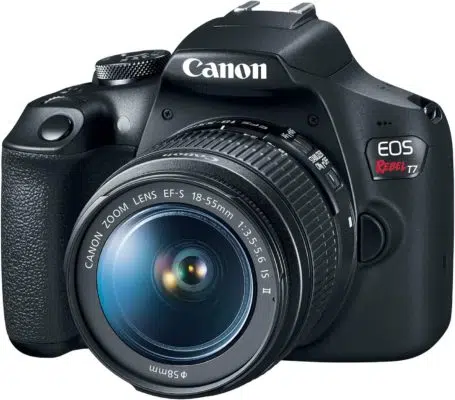
Best beginner DSLR camera
Type: DSLR | Sensor size: CMOS (APS-C) | Resolution: 24.1 Mega Pixels | Lens: 18-55mm Lens | Viewfinder: Optical | Screen type: 3.0-inch LCD with 920,000 Dots | Maximum continuous shooting speed: 3 fps |
The 24-megapixel Canon EOS Rebel T7 is an entry-level DSLR camera that comes at an affordable rate.
The Canon EOS Rebel T7 camera delivers better picture quality and more control over the images than most of the cameras and smartphones available. This particular model, the T7, comes with a lot of features, a 24-MP sensor, and some performance improvements.
The new EOS Rebel T7 is one of the smaller DSLR cameras on the market. The plastic material of the camera’s body makes it lightweight at 1.75 pounds, which includes the battery and the SD card. The measurement of the whole camera body is 5.1 x 3.9 x 3.1 inches. The grip of the camera is wrapped in textured rubber that provides comfort.
The continuous shooting and autofocus speed of this camera is good for any shooting conditions. The camera has a nine-point autofocus system that works with high-contrast scenes, so AF and continuous shooting are ideal with this camera.
The combination of price, features, and image quality makes the Rebel T7 a much sought-after DSLR camera because it is great for anyone who is on a budget.
The T7 offers some basic and advanced camera features so you can choose between easy operation and control over your picture taking.
Pros | Cons |
| ➕ Easy to use | ➖ Slow continuous speed |
| ➕ Affordable | ➖ Absence of 4K video |
| ➕ Good image quality |
Latest Price on Amazon:
16. Panasonic Lumix FZ300
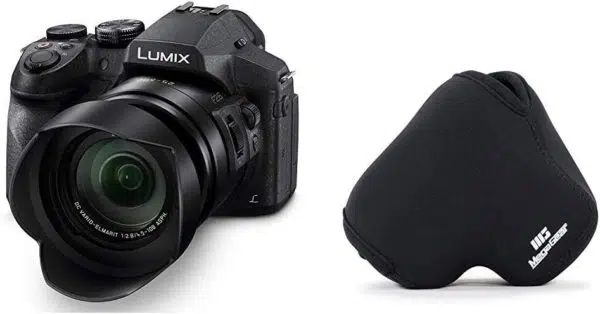
Best camera with 4K photo technology
Type: Long Zoom Digital Camera | Sensor size: High sensitivity MOS sensor | Resolution: 12.1 MP | Lens: Leica DC 24X F2.8 Zoom Lens | Viewfinder: 1.44m-dot resolution | Screen type: Large 3.0″ 1.04m-dot free-angle touchscreen LCD | Maximum continuous shooting speed: 12 fps | Movies: 4K
This Panasonic Lumix FZ300 camera has an exclusive 4K Photo technology that uses 30 frames per second. It has a high-resolution 4K video to extract them as photos.
The Leica DC lens has a full F2 zoom range and an 8 aperture level for enhanced low-light shooting that meets the stringent quality standards that have been set up by Leica.
The 12.1 MP high-sensitivity MOS sensor with the Venus engine excels in diffraction compensation. It yields images that are crisp and free from artifacts associated with the small aperture settings.
The FZ300 supports wireless image transfer when you pair it up with a free Panasonic Image App for Android and iOS.
The app supports geotagging and remote control with a Live view feed that displays on your phone’s screen. It is a smooth stream and you can tap to focus on the area.
This camera is splash-proof and dust-proof. It has tight seals in every joint, dial, and button, so it works fine even in the toughest weather conditions.
This camera comes with high-quality Neoprene material that has foam padding protection. The camera is protected from dust, dirt, scratches, bumps, and moisture as well.
Pros | Cons |
| ➕ Good image stabilization | ➖ Expensive |
| ➕ Weather resistant | |
| ➕ Raw image capture |
Latest Price on Amazon:
Panasonic LUMIX FZ300 Long Zoom Digital Camera Features 12.1 Megapixel, 1/2.3-Inch Sensor, 4K Video,…
- 4K video and 4K photo: Panasonic’s exclusive 4K photo technology uses 30 frames per second in high resolution 4K ultra HD video to extract them as photos; You’ll never miss that moment again
- Leica DC Vario Elmarit lens: 24x zoom (25 600 millimeter with Full zoom range F2; 8 aperture for enhanced low light shooting meeting the stringent quality standards established by Leica
- High image Quality: The 12.1 Megapixel high sensitivity MOS sensor with the venus engine excels in diffraction compensation, yielding images that are crisp and Free from artifacts associated with…
- Rugged Camera Design: Splash Proof/dustproof rugged camera design with tight seals on every Joint, dial and button, so it stands up to harsh weather conditions and challenging
- 5 Axis Hybrid Optical Image Stabilizer Plus: Reduces blur from 1 handed video shooting by compensating for 5 types of movement; Level shot function detects horizon line and maintains it, even if the…
The Best Accessories for Cameras
1. Manfrotto 190XPro4

Manfrotto 190XPro4 is a budget-friendly tripod that offers great value for your money. The bottom legs are strong enough and quick to deploy.
The Ducati-inspired high-grip rubber leg warmers make the model easy to hold and provide a good grip in extreme temperatures. Its innovative center column allows you to take clicks from different angles, making it a good pick.
Latest Price on Amazon:
Manfrotto 190 4-Section Aluminum Tripod with XPRO Ball Head
- Manfrotto 190 4-Section Aluminum Tripod – XPRO Ball Head – 200PL Quick Release Plate with 1/4″-20 Screw and 3/8″ Bushing Adapter – Manfrotto 10 Year Limited Warranty (6 Month + 9 Year & 6 Month…
- 90 Degree column system lets you shoot from new perspectives
- Efficient, effective Quick Power Lock System
- Add accessories quickly with the Easylink connector
- Smooth movements thanks to the leg angle selector
2. Canon RF 35mm
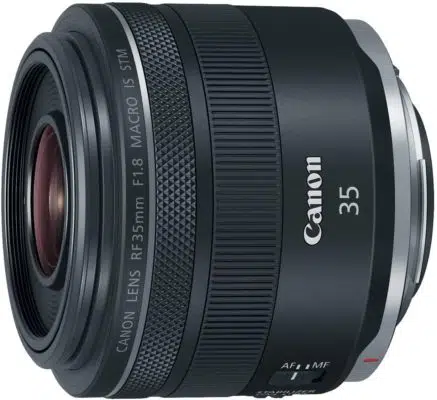
Canon RF 35mm is a versatile and fairly sensible lens to carry around. It is great for creatives and artists who are interested in travel, nature, street, portraits, and landscape photography.
The image stabilization is also great, making it super easy to focus on closer objects. The control ring is excellent, and the camera responds without delay.
Latest Price on Amazon:
Canon RF35mm F1.8 is Macro STM Lens, Black
- Compact macro Lens with 0.5x Magnification Ratio
- Minimum Focusing Distance of 0.56 ft. ; 0.17M
- Control Ring for direct setting changes
- Optical Image Stabilization at up to 5 Stops of shake Correction
- 12 pin Communication System
3. Canon 2140C001

The Canon 2140C001 BR-E1 is a must-have remote controller for DSLRs that offers Bluetooth support. The pocket-sized remote is super effective when you want to click your own photos.
You can even modify the focal length of the lens for zooming adjustments. With a battery life of over a year, you won’t have to worry about it on the go.
Latest Price on Amazon:
Canon Wireless Remote Control BR-E1
- A wireless remote controller compatible with Bluetooth enabled cameras for wireless focusing, still shooting and video recording
- Zoom capability using the Power Zoom Adapter PZ-E1
- Operating distance is approximately 16 ft in any direction
- Compatible with: PowerShot G5 X Mark II, PowerShot G7 X Mark III, EOS Rebel T7i, EOS Rebel SL3, EOS M50, EOS M50 Mark II, EOS RP, EOS R, EOS R6, EOS R5, EOS R3, EOS R5 C
4. Elinchrom D-Lite RX 4/4 To Go
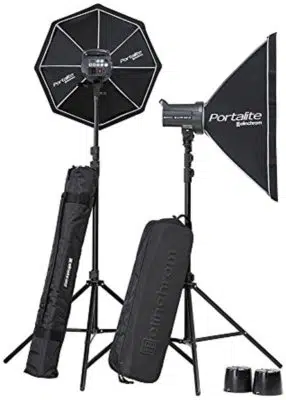
The Elinchrom D-Lite RX 4/4 is a great lighting rig with two studio strobes, softboxes, stands, and a transmitter. Priced reasonably and with 400 watts of power, it’s enough to illuminate large spaces for shooting photos and videos.
And with easily replaceable strobe lights, it’s super affordable for creatives. It is a lightweight all-in-one kit that provides exceptional value.
Latest Price on Amazon:
Elinchrom D-Lite RX 4/4 Studio Flash to Go Kit (EL20839.2)
- START YOUR STUDIO – This versatile two-light kit includes everything you needed for basic studio lighting set-ups; two D-Lite RX 4’s, one Skyport Transmitter Plus remote, one rectangular softbox, one…
- GET A BRIGHT START – With 400ws of power and recycling times of 0.35-1.6 sec. (115V) packed into one uncomplicated and reliable unit, the D-Lite RX 4 is an excellent starting point for an adventure…
- AND TAKE CONTROL – Take full control of your lighting from atop your camera. With the Elinchrom Skyport Transmitter Plus (sold separately), you can trigger and adjust the power level of your strobes…
- WITH MONOLIGHTS ENGINEERED TO ENDURE – Built to last for the long run and compatible with Elinchrom’s wide-ranging line of light shapers, strobes, and accessories: D-Lite RX’s are the first building…
- WHAT’S YOUR NEXT ADVENTURE? – At Elinchrom, we focus all our expertise and technological resources on creating products to inspire and keep pace with you as you expand your creative horizons. Be it by…
Related Post: Best Photography Lighting Kits & Studio Lights
5. Hoya PRO1 Digital Circular PL
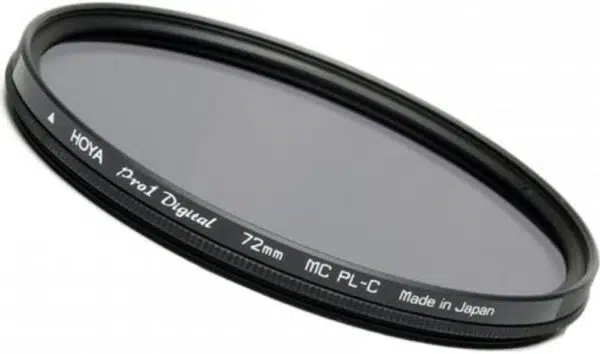
Hoya PRO1 Digital Circular is a polarizing filter, designed to reduce the reflection and glare of light while enhancing saturation and natural lighting. It also enhances the saturation and natural light.
This is a must-have tool for nature and landscape photographers. With this circular polarizing filter, the amount of enhancement is also adjustable to take perfect shots every time.
The filter is equipped with a straight knurling edge for quick removal and attachment.
Latest Price on Amazon:
Hoya 37 mm Pro1 Digital Polarised Circular Filter for Lens, Black
- CIRCULAR PL filters allow you to remove unwanted reflections from non-metallic surfaces such as water, glass etc.
- They also enable colors to become more saturated and appear clearer with better contrast
- This effect is often used to increase the contrast and saturation in blue skies and white clouds
6. Zeiss Lens Cleaning Wipes
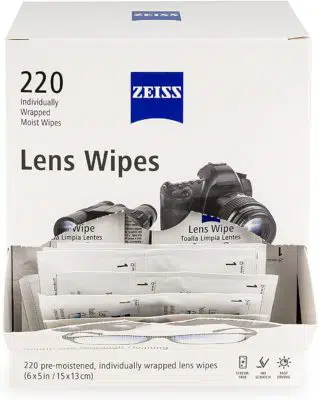
Don’t clean a camera lens with your shirt or other clothing! Zeiss lens cleaning wipes are the perfect solution. You can clean lenses safely, removing fingerprints, oil, dust, smudges, etc., without streaking or scratching.
The individual disposable lens wipes are good to use on the go, and they come at a pretty reasonable price, too.
Latest Price on Amazon:
Zeiss Lens Wipes, White, 220 Count…
- GENTLE: Pre-moistened lens wipes gently clean glasses and lenses
- SAFE: Safe for cleaning lenses with anti-reflective coating or prescription
- EFFECTIVE: ZEISS lens wipes clean without leaving streaks or residue
- SCRATCH FREE: Guaranteed not to scratch glasses or lenses
- CONVENIENT: Individually wrapped, disposable lens wipes, for convenient use on the go
How to Choose a Camera for Graphic Design
When you head out shopping to choose the best digital camera for your graphic design needs, it can be very easy to become overwhelmed and just get easily frustrated and give up.
To offer some help, we wanted to take a bit of a closer look at the different types out there so you don’t look like a deer caught in the headlights at the store.
You must consider:
- Your budget
- The different types of cameras available
- The features & quality required for your creative needs
What’s Your Budget?
Your budget will be the quickest way to narrow down your needs. Expect to pay approximately:
- Budget: $400-$600
- Mid-Range: $1000-$2500
- High-End: $2500-$5500+
Different Types of Digital Cameras
- Standard Compact
- Zoom Compact
- Adventure Cameras
- Advanced Compact
- Super Zoom (bridge)
- Compact (Mirrorless) System Cameras
- DSLR
1. Standard Compact ($)
Commonly known as a point-and-shoot camera, these tend to be small, light, and fairly cheap. They are usually the top choice for non-professionals when they first start taking digital photographs. Fully automatic, they can have some manual exposure options and are likely to have a built-in flash and LCD screen on the back. Many of these will have HD video options and in some cases, will let you access WiFi so you can upload your photos and videos instantly.
2. Zoom Compact ($)
While pretty similar to a standard compact camera, a zoom compact will usually benefit from a lens that has a more powerful zoom and can be a bit larger and sturdier. These types of cameras are usually equipped with HD video recording along with manual and automatic exposures. Some higher-end models will include GPS for geotagging.
3. Adventure Cameras ($$)
Adventure cameras are designed to withstand the elements that you might put them through. These will typically be waterproof, shockproof, and in some cases, even freezeproof. While similar in design to compact cameras, they will normally offer some limited manual exposure options and a similar zoom encased in reinforced glass. These are a good choice for those looking for a basic digital camera and also enjoy the great outdoors.
4. Advanced Compact ($$)
At this point on the store shelf, the cameras tend to be designed more for those who are experienced photographers and come with the features and specifications that you may be looking for. With options such as manual exposure and manual focusing, an advanced compact camera may be a good choice for those who want more control over the photos that they take.
5. Super Zoom (bridge) ($$)
While the use of Super Zoom or bridge cameras has declined recently, for some, they are still a good stepping stone between a compact camera and a DSLR, which is where the bridge camera name comes from. These cameras are packaged with an SLR-type body which provides you with hand grips as well as an electronic viewfinder. These tend to come with a powerful zoom lens as well as image stabilization.
6. Compact (Mirrorless) System Cameras ($$$)
More professional photographers are beginning to invest in these types of cameras, which can allow interchangeable lenses to provide greater control over the pictures you are taking. CSCs offer most of the features as well as the capabilities found in SLR cameras but can be lighter, smaller, and less expensive.
7. DSLR ($$$)
A DSLR is typically what a serious amateur or even professional photographer will use. Offering excellent image quality, a multitude of creative controls, and the ability to change lenses, their popularity is no surprise. Many will use a sensor size called APS-C while full-frame sensors tend to be found on higher-end models.
8. Medium Format Cameras ($$$$)
The cream of the crop, medium format cameras have even bigger sensors than a full-frame DSLR. This means that the image resolution is higher. However, this higher resolution comes at a price, literally. The cost of a medium format camera can reach prices up to $50,000. These are more than likely not going to be used by an amateur photographer.
Features to look for in Cameras
Once you know what type of camera you’re looking for, you want to make sure that the camera you’re buying has the features and specifications you’re looking for. But what should you look for? There are a lot of options out there. Let’s take a closer look at what you should look for in a camera.
- Interchangeable or fixed lens
- Mirrorless or DSLR
- Photo quality
- Video quality/control
- Low-light quality
- Zoom
- Viewfinder
- Wireless
1. Interchangeable or fixed lens
Depending on the type of photography you may be doing, choosing between an interchangeable and fixed lens camera can come down to the advantages that both have to offer. With interchangeable lenses, you always have the option to buy another lens to suit your needs. However, this can add to the size of the camera while a fixed-lens camera can be much smaller.
2. Mirrorless or DSLR
If you decide to go with an interchangeable lens, the next decision is whether you want a DSLR or mirrorless. Many people believe that DSLR cameras are the best option for high-quality, high-speed photos. This isn’t necessarily true because a mirrorless camera can be very similar to a DSLR. Some of the biggest differences lie in the better battery life of a DSLR camera and the cost of a DSLR is much cheaper than a mirrorless camera. A mirrorless camera can be a good choice if you’re shooting video because the autofocus performance and LCD view screen make it much easier to operate.
3. Photo quality
Ideally, this should truly be the first thing you consider when you choose a camera and if it is, you will want to consider the size of the sensor in the camera. As a general rule of thumb, bigger is better, but bigger also comes with a higher price.
4. Video quality/control
If you’re shooting casual video, a camera with good autofocus may work best. If your needs are a little more advanced, a camera with 4k support, customizable tone curves, lots of touchscreen controls plus frame rate options may be a better option for your needs.
5. Low-light quality
If you can see yourself taking a decent number of pictures in low-light situations, you’ll want to compare the maximum native ISO sensitivity capability. Choosing a camera with a large-size sensor along with good image stabilization will allow you to use slower shutter speeds and take better pictures in low-light situations.
6. Zoom
For professionals, the level of zoom that can be achieved with their camera can make or break their career with the use of telephoto or super-telephoto lenses. For amateur photographers, a camera with a normal level of zoom can help you achieve some stunning photos. Deciding what types of photos you intend to take will help determine the level of zoom that’s best for you.
7. Viewfinder
The days of holding a camera up to your face and squinting through the viewfinder are a thing of the past with the inclusion of an LCD screen on the back of many cameras, making it easier to shoot pictures in direct sunlight. Using a viewfinder to take pictures also makes it easier to hold the camera steady.
8. Wireless
Most cameras on the market today will have some WiFi or Bluetooth integration options to upload photos to your computer right after you take them. Many times, this process will be done through a native app found on the camera itself. It is always a good idea to read reviews of the app prior to buying the camera.
Frequently Asked Questions
Which cameras are best for graphic designers?
Sony A7 III is the overall best camera for graphic designers.
What brand of camera do most professional photographers use?
Canon or Nikon DSLRs are the choices of many professional photographers.
Which camera has the best image quality?
Olympus Tough TG-6 is an affordable good digital camera for beginners in the graphic design community.
What is the best budget camera for graphic designers?
What is the best 8k camera for designers?
The best 8k camera for designers would be the Canon EOS 5D Mark IV because of its incredible autofocus and image quality.
Best Cameras for Graphic Designers & Creatives in 2024
When you’re on the hunt for a new camera, it can be tough to know which ones will be able to take care of your needs.
Hopefully, with our list of the Best Cameras for Creatives in 2024, we’ve given you some options you can seriously consider.
What do you believe is the best two camera settings for a graphic designer?


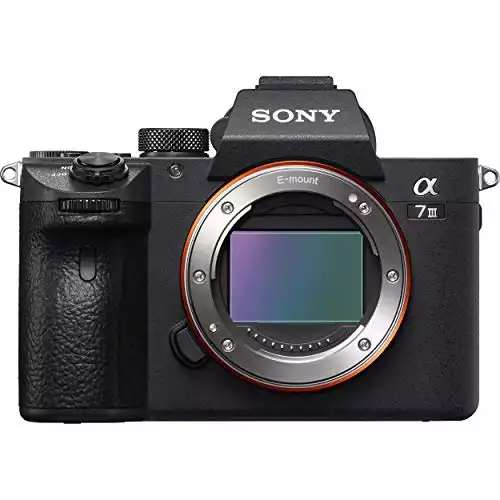
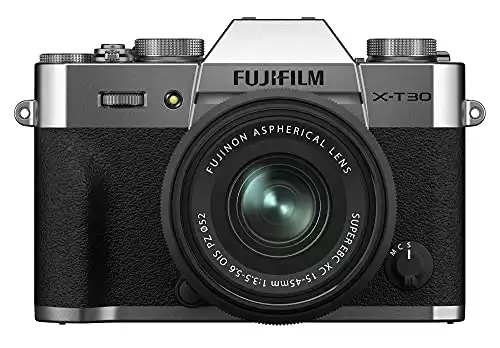
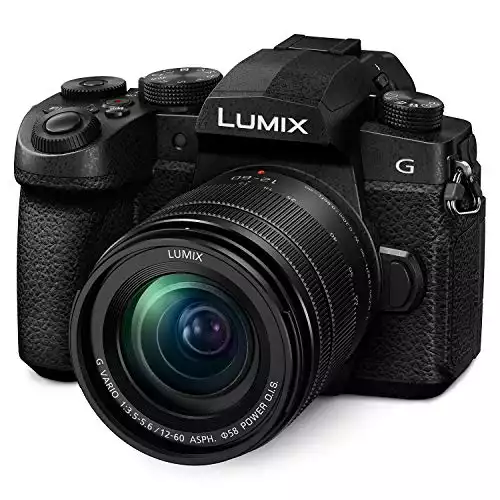







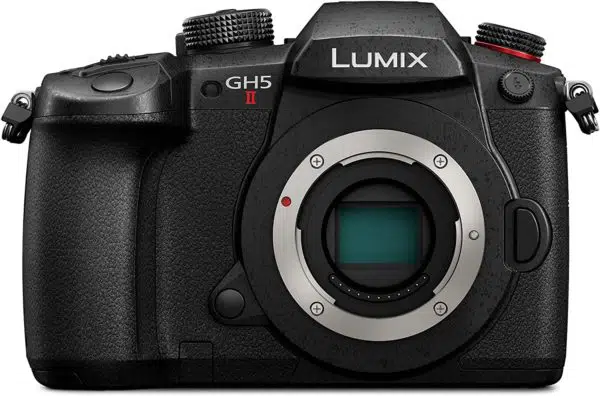

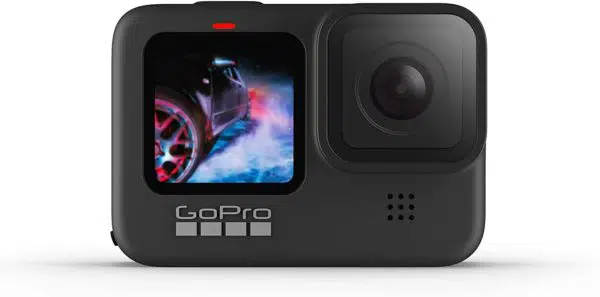









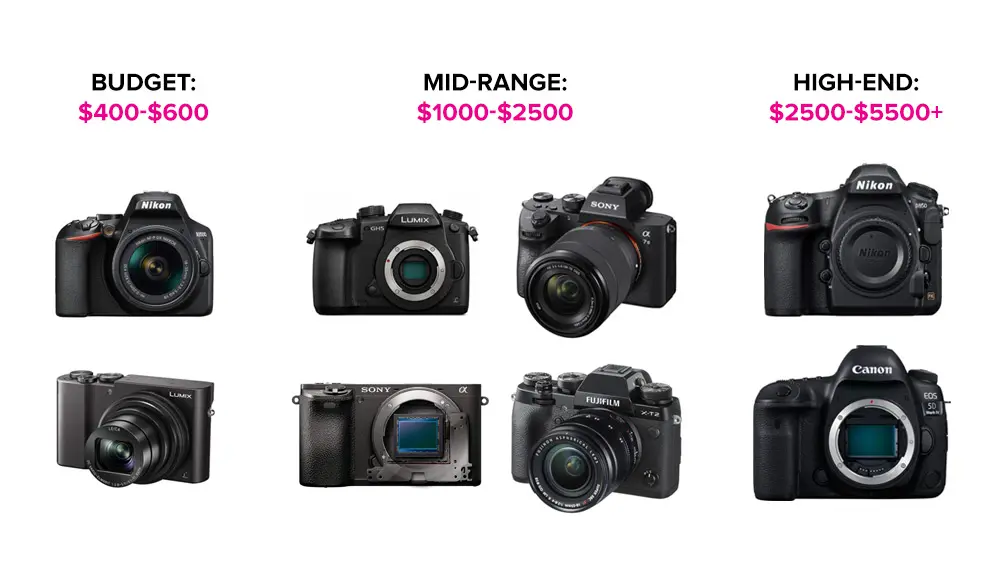
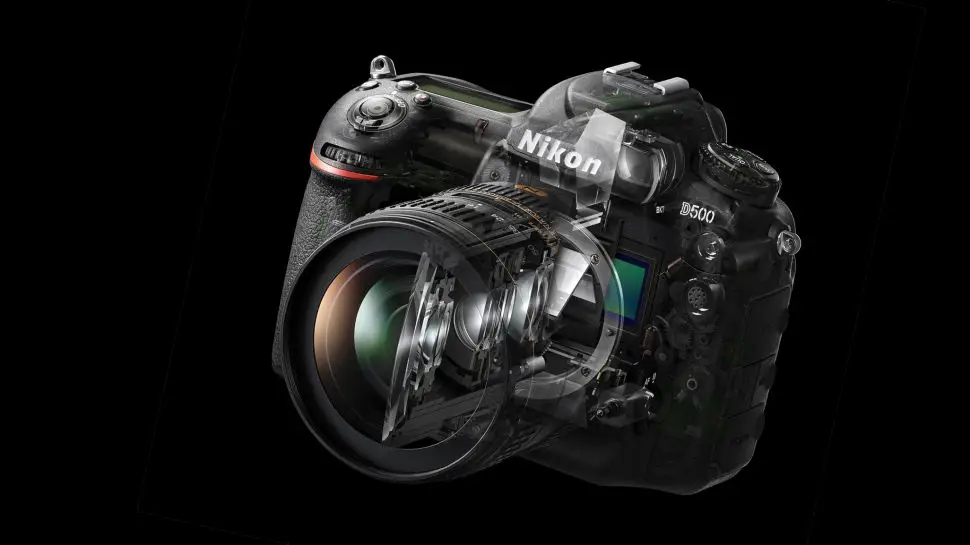
Post a Comment